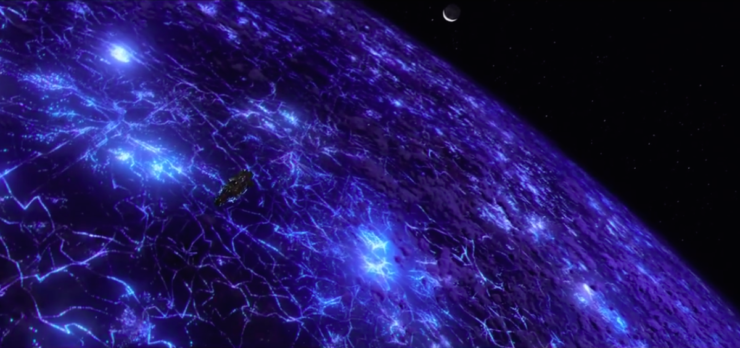You can enjoy The Expanse for a lot of reasons. Maybe it’s the characters, the scrappy found families, accidental do-gooders, swearing politicians, steely Belters and protomolecule plotters. Maybe it’s the sheer beauty the show is capable of: the alien vistas of Ilus, the ships in orbit, the vision of a half-drowned New York, those stunning titles. Maybe it’s the way the characters grow around each other, or the way the sets look lived-in and detailed, like places you’d want to wander through, figuring out what each item means to the person it belongs to.
It’s all of those things for me. But it’s also the question the show asks over and over again: Is this how we want to live?
Spoilers for season four.
The Expanse is full of options, but it’s never purely prescriptive. Obviously we (hopefully) don’t want to live like those protomolecule scientists with their empathy turned off, but a lot of the possibilities have some appeal. And if they don’t, the story will show us how they work, anyway. How a person lives through trauma and grows up to try to control his environment. How the mistakes of youth lead to the certainty that lives can change for the better. How being an idealistic dummyhead can both get you into trouble and lead you to some truly astonishing places. How you can tell yourself a story about why you’re doing the things you do, and why someone else is doing the things they’re doing—and you can be totally wrong about at least half of it.
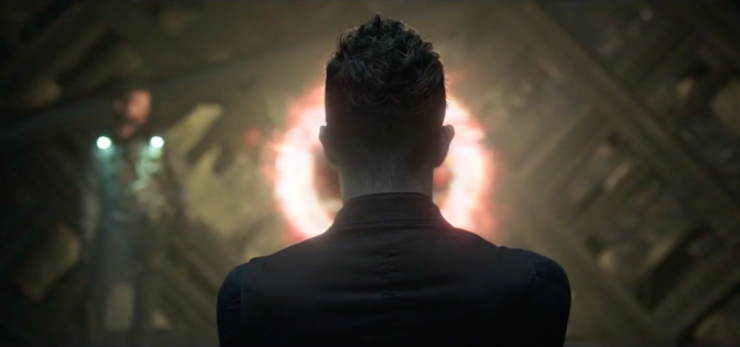
This season was fantastic. It’s not without mysteries, but the WTF aspect of the protomolecule took a backseat to the personal and political narratives, so you can spend less time trying to figure out what’s going on and more appreciating the way everything fits together. Four seasons in, the regular characters feel lived-in but not static, and this season’s additions—particularly Okoye and Murtry—were excellently cast. Amid all the big plots and plans, global elections and planet-wide light shows, the best little moments firmly center this show in its characters, and even the minor ones play thematic roles: the running thread of the red-headed orphan, whose presence tells stories about family and kindness, or Leelee telling Bobbie what really happened with the man she killed, and explaining her own defensiveness in the process. It’s incredibly deft writing; you can unpack almost any scene and find all the building blocks, the ways the characters drive the plot with their choices and beliefs and actions.
Buy the Book
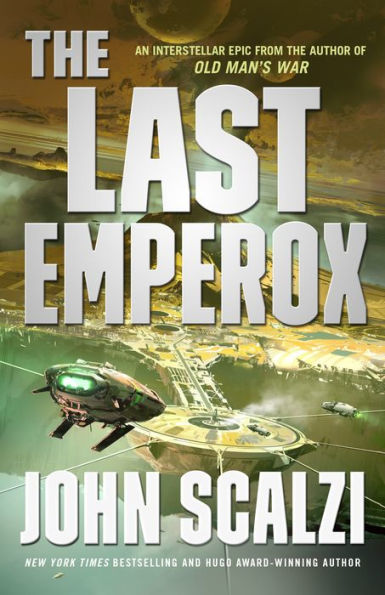

The Last Emperox
It’s also a freaking great action movie sometimes, and that’s what a lot of “Saeculum” is, as it wraps up the main threads on Ilus. Just about everybody gets what’s coming to them, which is to say: Belters and non-murderous RCE folks get saved, the protomolecule gets turned off for good (here, anyway), and the laws of physics return to full functionality in the process.
If you are a morally gray character who’s fundamentally misread the needs and drive of the dude you’re banging, though, RIP. I hoped that Chandra Wei wouldn’t meet her book counterpart’s fate, because she was notably more interesting than a book character I barely remember. She dies because she doesn’t understand Amos, but she also dies because Murtry lies to her, and she believes the story he tells in which they do the ugly thing and they finally get the reward. Amos doesn’t believe in that story.
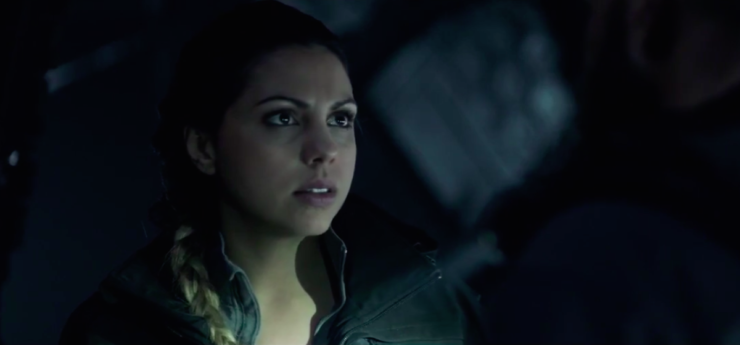
No one person saves the day in this story, except maybe Miller. And I mean Miller, this time, not the Investigator. (“It’s not my hat.”) It’s Miller fighting his way through being reset and reset and reset; Miller clinging to all that care and hope in Holden’s mind, rebuilding himself with that raw material. The Miller that turns off the protomolecule isn’t the same Miller we knew back in the first season. This one is intense, fast-talking, focused; he knows his time is limited and he knows what he needs to do. He has purpose, and it doesn’t change the kind of person he is, but it changes how he acts. He’s literally been transformed, but he also did some of the transforming.
Holden stops the bad guy, but it’s Okoye who helps Miller turn off the planet, and it’s fitting that the scientist who wants to understand winds up knowing/feeling more than she bargained for. We know Miller, so it’s easy to underestimate the bravery that goes into her actions: believing the robot-bug-dog (how did they make a handful of panels and too many legs have all the charm of a dog!), listening to it, throwing herself bodily into helping it. It’s scientific curiosity, but it’s also faith in Holden—faith based on everything he’s done up to then.
The protomolecule is done, but the “eye of an angry god” (Sauron? Is that you?) still floats there, unbothered. Okoye calls it a field effect. Will she go back through it? Will she try to understand more? And what the heck is up with the landscape Holden sees when he climbs to the top of the ruins?
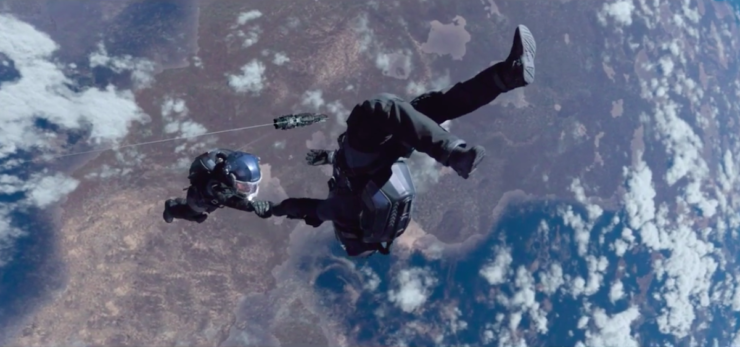
Up in space, Alex is an extremely competent badass, and his moment of righteous fury at the Edward Israel’s shuttle action almost makes up for how Cas Anvar’s underused character too often follows in Naomi’s emotional footsteps, saying things (meaningful, heartfelt things!) to Lucia that we already know. But Naomi’s rescue of Lucia is perfectly done: Naomi’s instant reaction, Lucia’s panic, and the way it’s clear to them and us that Lucia does want to live. Her story is the story of earning—for yourself, not in the eyes of anyone else—the right to another chance.
Everywhere else in the system, things are less hopeful. The explosion on Mars took me entirely by surprise, even though I knew Bobbie was right, that something was up and that it wasn’t good. Is this Belters destroying Mars? Martians giving up on Mars? Both? Just a distraction for the inners while other plans kick into gear?
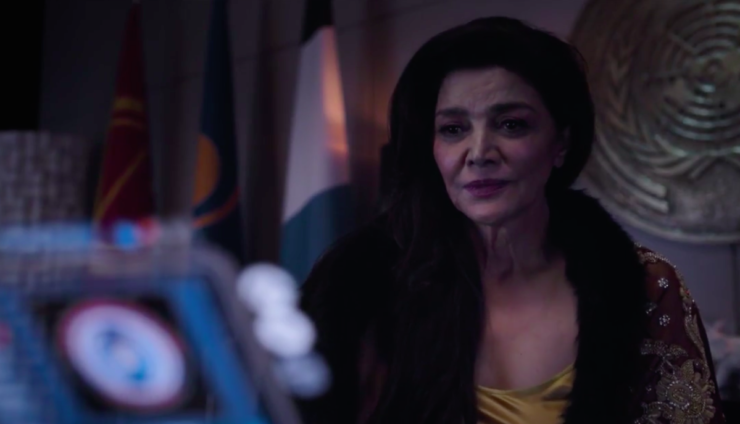
On Earth, Avasarala loses the election, and maybe loses Arjun, too. And yet, doesn’t she almost seem relieved when she leaves that message for Gao? She’s loose and relaxed, wrapped in a robe over the most revealing clothing we’ve ever seen her wear. She’s barefoot! She’s vulnerable. The posturing is over. Her war is over. The gates, the aliens, and the earthier problems of governance are all someone else’s problem now. Well, until Bobbie’s message arrives.
Gao’s victory speech is predictable in that I predict it leads to a lot more problems. I keep asking myself why I trust Okoye’s interest in the aliens and not Gao’s, and it keeps coming back to science. Gao just sees empty planets ripe for human colonization. Okoye wants to see what was—and what is—on those planets. It could be the difference between disaster and exploration.
Or maybe disaster is on its way to Earth already.
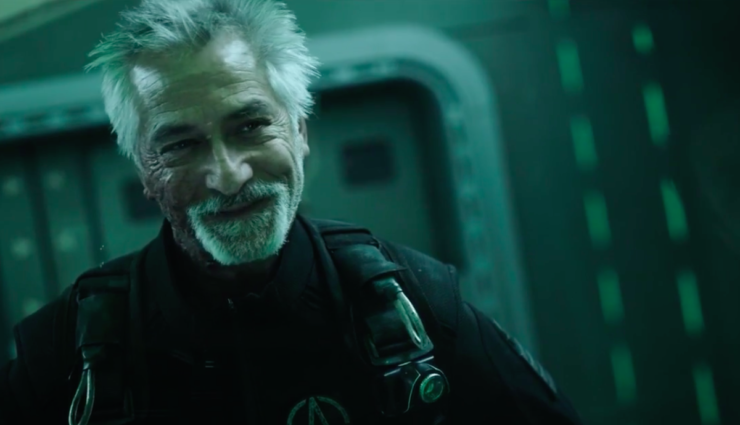
From the reminiscing to the unopened bottle of booze to his affectionate farewell with Drummer, everything pointed to Ashford’s fate being sealed. But has anyone ever seemed so satisfied with a seeming failure? Ashford rockets onto Marco’s ship feet first and guns blazing, and goes out singing—a beautiful sendoff for a complicated character. His conversation with Drummer an episode or two ago, about changing or not changing with age, was all reflected here: the violence he both abhors and respects, his experience, his understanding of Marco’s power.
But he also misunderstands Marco. When he’s trying to convince a shipmate not to do more violence, Ashford says of the victim, “He is not only himself. He is everyone who cares for him.” He spins out a story about all the people who might care if a single man dies—people who would grieve or retaliate. He says that Marco knows this, knows that you have to show strength and a smile.
If Marco knew this, he’s long since forgotten. There is no smile in the strength he shows in that last shot.
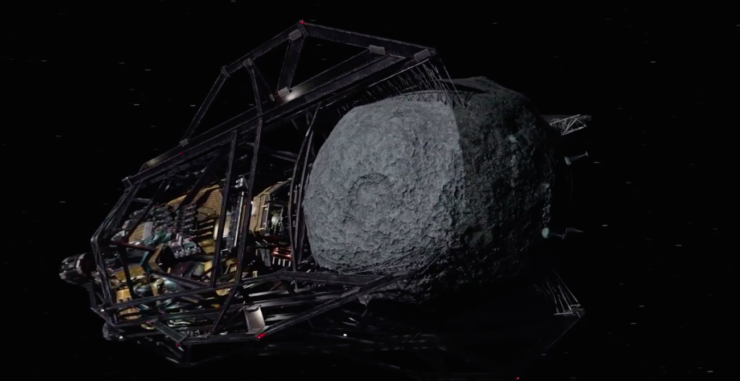
Putting Marco and Murtry in the same season creates an interesting reflection. On the one side, Murtry, who thinks he’s just playing a role defined by history, accepting death (the deaths of others, that is) as an inevitable step toward building a new frontier. Murtry isn’t a powerful man, but he’s a soldier for the dominant culture. Marco is the opposite—a member of an oppressed class, taking his fight to the powerful—but he believes in the same destructive tools.
No one on The Expanse has the answer to any question about how we ought to live—now or in the future. Naomi is smart as hell, but even through her idealism and empathy she’s a flawed person who’s made mistakes. Holden constantly mucks things up through his own idealism (including, from Avasarala’s perspective, the entire Ilus trip). Avasarala is a career politician who takes her own fight too far—not in the same ways Murry or Marco might, but she’s still willing to sacrifice things that shouldn’t be sacrificed. Bobbie’s clinging to the idea of Mars. Drummer is unyielding, which is admirable but also inflexible.
Everyone has a history; everyone has a different idea about the future; everyone’s complicated narrative thread is a reminder of how difficult it is to find a new way of thinking. Humanity can’t adjust to the sheer scale of the conflict between the protomolecule builders and whatever killed them. We can’t focus on things that much bigger than ourselves and still fight our own wars. So how do we change? How do we keep buying ourselves a little more time, and then doing the right thing with it?
FLOTSAM AND JETSAM
- Nothing in the ruins looked like I imagined, ever: What did that space DO? What was it for? What did the beings who lived there look like? Absolutely nothing is clear and that’s so weirdly satisfying and great. I like when the alien things are truly alien!
- “Is there something we still need to do?” Amos has so many good lines, and I love that he warns Okoye that the space slip-n-slide might be a one-way trip. That’s awfully considerate of him.
- The swarm coming in when Miller starts to succeed is a great touch, and reflects the swarm coming in right after the Roci lands—maybe it recognized the threat that Miller represented even then.
- Another great touch is the tether catching fire just seconds after they drop it—a reminder of how close to a fiery death the ships were.
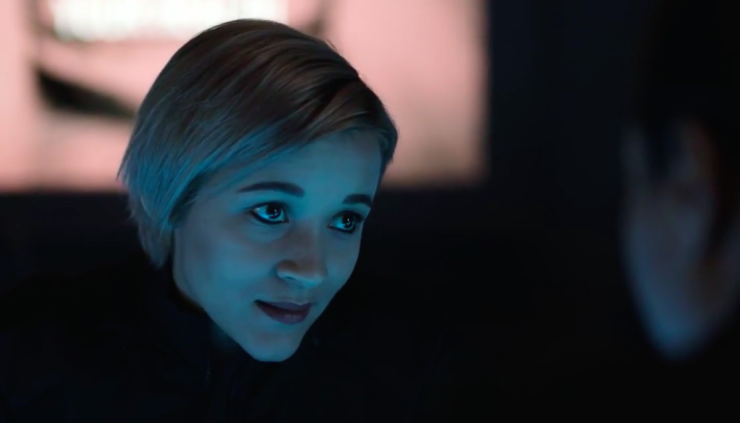
- One of my favorite tropes is “super annoying character who gradually becomes understandable and great,” so bravo to the writers (and actress Dayle McLeod) for transforming Leelee so well.
- I … really thought Amos meant something else when he said he was going to test out his regrown hand. The look in his eyes when he swings at Murtry, though, yikes.
- Ashford send his final message to Drummer, right? Right?
- Okoye says when she fell through the eye/bomb/field that she felt a presence, something moving toward her, and Holden says he’s felt it when they go through the ring gates. But the gates were made by the builders, and the eye/bomb/field by whatever killed them. How does that work? (Did they destroy themselves? Factions, just like people have? Wouldn’t Miller be able to tell?)
RAMPANT SPECULATION
I need to talk about the plot of Nemesis Games for a second, so let’s go to spoiler town and white this next part out. If you haven’t read through book five and you don’t want to know anything, now’s the time to stop reading!
(Highlight text for spoilers!)
So. Did we just skip half of book five… entirely? Did Naomi’s plot get replaced with Ashford’s hunt? Will she go searching for Filip instead of Marco coming to her? And, maybe most importantly, how long does it take each of those asteroids to get where it’s going? I really, REALLY want to see Amos and Clarissa’s apocalypse road trip, so here’s my hope: either it’s going to take a good long while for the asteroids to get to Earth, so the first half of Nemesis Games will still happen before they hit, or season five will start with the strike and jump back in time to show what happened to the main characters between the departure from Ilus and the asteroid strike. We don’t know how much time has passed by the time Ashford finds Marco. It could be months.
What do you think they’ll do? Where do we go from here? Avasarala has been summoned to Luna, which points to some parts of Nemesis Games staying the same, but there’s so much possibility!










